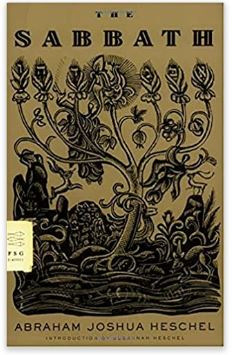By The Revd Canon Professor James Woodward
1 June 2023

Books age. They have a shelf life. I have always been interested in other people’s shelves and how they organise their books. This becomes especially acute when we age which inevitably means downsizing. What remains on that small bookshelf that fits so well between table and chair? Left with a choice of 50 books, what would be on your list?
Well – and you may have guessed where I might be going with this – Heschel on The Sabbath would certainly be on mine. I have read it many times and it never fails to yield something new. I always have a couple spare to be able to offer a copy to those who come to Sarum College to prepare for their sabbatical.
In 11 skilfully crafted chapters Heschel reminds us that Judaism is a religion of time and that aspires to sanctification of time. Time, however, is complex and diverse. No two people ever experience time in the same way. No two days are ever alike. All moments are precious and unique. We feel under stress because we have too little time, or bored because we have too much time! How then should we use our time? What does time mean for us?
Sabbath and sabbath time is holy. In Judaism, this holiness is derived from the holiness of God. Its observance is sanctification, hallowing.
“…the task of man is to conquer space and to sanctify time.” is the core mantra of this meditation on Sabbath.
The sanctification, the redemption of time is the heart of the meaning of Sabbath. Heschel invites us to be intentional about the discipline of observance as it responds to and is shaped by God.
Sabbaths are our great ‘cathedrals’. Jewish ritual may be characterised as the art of significant forms in time. The main themes of faith lie in the realm of time. Jews remember the day of the exodus from Egypt. They remember the day when Israel stood at Sinai. Jews continue to look towards the Messianic hope. This is the expectation of a day in time which will be the end of days.
There is a poetry and harmony about this text. It is carefully organised into three parts as Heschel takes his reader into the nature and gifts of Judaism. We learn about words and their meaning. I appreciated the deep dive into the word kadosh. Translated as ‘holy’ it conveys the glory and mystery and majesty of the divine. We learn about the encounter with the Hebrew scripture and how those encounters can transform where we look for truth.
The essence of the Sabbath is that it is completely detached from the world of space. Sabbath celebrates time rather than space. Heschel explores some of the tyrannies of space, reminding readers that on the Sabbath we try to become attuned to holiness in time. It is a day on which we are to share in what is eternal in time. We honour and celebrate the mystery of creation.
Jewish ritual is an ‘architecture of time’. The Sabbath is preeminently a ‘palace in time’. In this sense we all live in between the present and the future. The Sabbath carries the Jew beyond space, beyond civilization. Faith is an invitation to be set apart and inhabit the world as bearing a gift. We attend to this gift in all time but especially Sabbath time. Sabbath is a day of meuiiha, of ‘rest’ in the sense of harmony and peace.
To return to my opening comment about the shelf life of books, it is worth noting that this book was first published in 1951. Has time changed? While Heschel’s exposition of the Sabbath strikes this reader as both profound and true, this generation is freer of constraint and perhaps liberated from some of the social constructs that surround time. I suspect that a younger generation will find much of this discourse lacking relevance. Some of its theological language might be obtuse and inaccessible.
However we might ask what is it that unites us across cultures, theologies and time? The need to rest, to switch off, to do nothing, to waste or use time differently in this functional and activist life? A new generation might use and misuse the gifts of progress. We share a spiritual pulse and a search for meaning. Perhaps we long for a deeper connection that can empower us to know and understand the shape of what life means and how we might grow in wisdom and compassion. Heschel asks us to consider what Judaism and what Sabbath can show us about human nature and its spiritual adventures.

James Woodward is Principal of Sarum College.
This article was adapted from a review that originally appeared on his website
Interested in Jewish-Christian relations and theology?
Don’t miss the study day on 20 June 2023 with James Roberts: Thinking Theologically about Jewish-Christian Relations: Towards a Positive Spirituality.

Leave a Reply